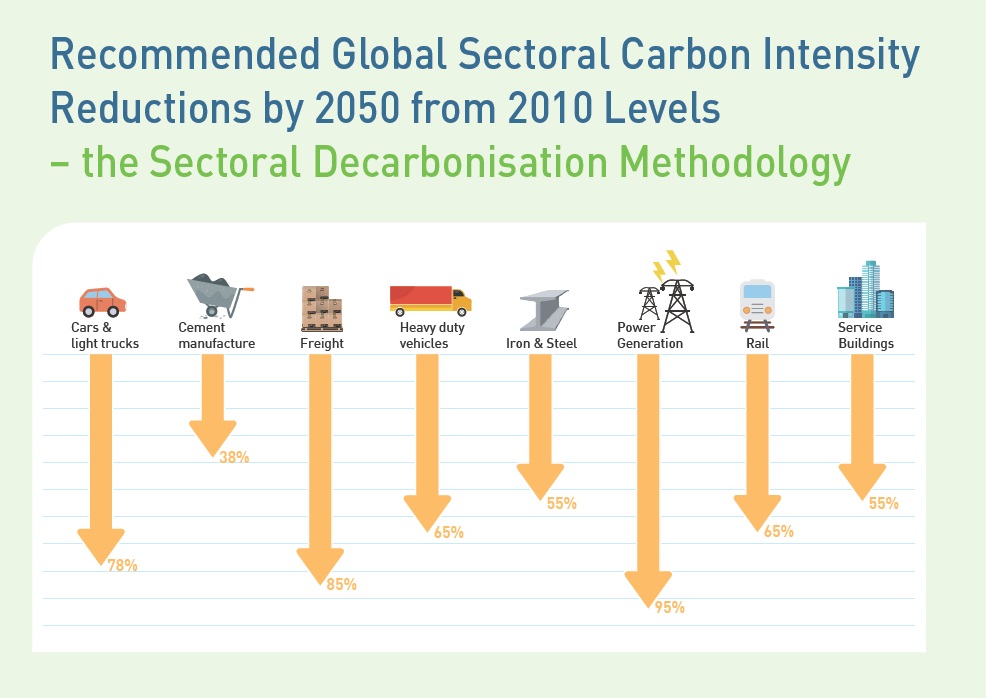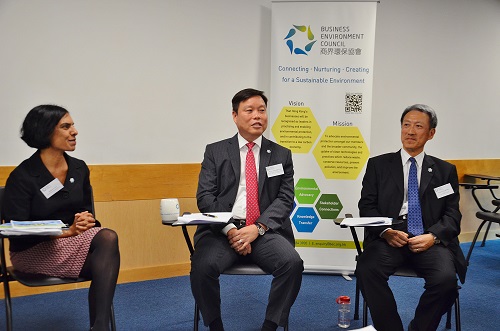Hong Kong, 8 May 2017 - Business Environment Council Limited 商界環保協會有限公司 (“BEC”) today released “Low Carbon Hong Kong: Supporting Business to Set Targets”, a report prepared by BEC Climate Change Business Forum Advisory Group. The launch event was well attended by government officials and BEC members from various business sectors.
This report started in January 2016 and was initiated by Hong Kong businesses after Paris Agreement in December 2015. It sets out why action by businesses to support a maximum temperature rise of 2C is important. It conveys the benefits to businesses of setting carbon reduction targets in line with this maximum and explains the methodologies for doing so. It incorporates findings on the challenges and opportunities of setting targets and developing supporting strategies within a company drawn from our cross-sectoral workshop in mid-March this year with over 30 participants. It proposes a Sectoral Decarbonisation Approach for Hong Kong businesses and sectoral sub-groups to take this approach forward in key Hong Kong sectors, and encourages businesses in Hong Kong to take part in this process.
BEC Chairman Mr Richard Lancaster said, “Hong Kong businesses can adopt the approach of setting targets with timelines and transparent metrics to reduce carbon emissions and do their part in combatting climate change, while adapting their business to flourish in a low or net zero carbon future. A steady transition towards a low carbon future involves long-term thinking and making the right strategic decisions now. Putting targets in place will guide businesses in making the decisions needed today to achieve a low carbon future.”
Chairman of BEC Climate Change Business Forum Advisory Group Mr Eric Chong said, "For businesses to be future-proofed as well as to play their part in addressing climate change, they need to develop corporate strategies with the goal of being climate neutral. Cutting carbon footprint is not only good corporate citizenship, it is also good business. I believe Hong Kong's businesses with their history of entrepreneurship and innovation are well-placed to take up the gains as a result of the huge shift that is taking place in Asia and beyond."
Overall, this report is a call to all businesses in Hong Kong to get involved in a process of setting max 2C temperature rise targets and supporting strategies, a process that is beginning to gather steam worldwide. It is also supportive of and aligned with the Hong Kong Government’s 4T (Targets, Timelines, Transparency and Together) framework for operationalising the Paris Agreement.
Highlights of the report:
1) Background
- The Paris Agreement on Climate Change 2015 is widely regarded as a game-changer. 197 countries across the world committed to the overarching objective.
- The objective is to keep the global temperature rise below 2°C, with carbon neutrality in the second half of the century.
2) Why should businesses look to set 2°C carbon reduction targets?
A. It’s a legal requirement.
- Under the Paris Agreement, China committed to working towards achieving no more than a 2°C temperature rise and to set carbon reduction targets with the aim of net zero carbon emissions in the second half of the century.
- In January 2017, the Hong Kong government formally stated that it had acceded to the Paris Agreement and committed to its 4Ts framework to operationalise the Paris Agreement in Hong Kong. As to the first T, targets, it committed to reducing the carbon intensity of its economy by 65-70% by 2030 (from 2005 levels), as a first step in line with China’s Nationally Determined Contribution (NDC). It noted that the Paris Agreement target is to make efforts towards 1.5°C with a 2°C maximum rise, and that the current NDCs will be ratcheted up.
- It also committed in the Energy Saving Plan 2015 ~2025+ to tighten codes and regulations.
B. It’s the right thing to do.
- To avoid dangerous climate change, including heat stress, flood risk and landslides, rising sea levels.
- For the benefit of our children and grandchildren, and those in poorer parts of the world already being affected by climatic change.
- Important that each country plays its part, as otherwise the commitment of others is undermined leading to a “tragedy of the commons” situation.
C. It makes good business sense.
There is not only a legal and a moral case, but a direct commercial interest for business to act:
- Levering in efficiency/costs-savings
- Strategic change to make the most of wider business opportunities
- Securing investment as investors are beginning to pay increasing attention to companies’ potential to withstand climate change and financial risk relating to carbon intensity.
- Stimulating ambition and innovation as setting long term targets can help bring employees, clients and the supply chain along in a process of change and transformation
- Enhancing the reputation of your business
3) Cross-Sectoral Workshop: Challenges and Opportunities for Hong Kong Businesses
In mid-March 2017, a cross-sectoral workshop was held and participated by nearly 30 executives from different industries. Findings and sharing are listed as follows:
A. Challenges
- One of the practical challenges in setting carbon targets is initiating a target-setting process within an organisation, and bringing this to a successful conclusion with a meaningful target that will be implemented. Challenges include:
- lack of a “compliance” driver, which is a key driver for most sustainability activities in Hong Kong
- the technical complexity of setting targets, especially long-term targets which involve looking far into the future and inadequate expertise in companies in HK in doing so
- lack of clarity in terms of company responsibilities (eg holding companies and subsidiaries)
- absence of a shared view across a company on the benefit and importance of action.
B. The Drivers and Opportunities
- Despite the barriers there was a strong feeling that there were drivers and opportunities. Points made included:
- Senior Management often do see the big picture.
- HKEx rules on reporting have begun to drive change and ensure some attention to environmental/climate change impact.
- Efficiencies and costs savings achievable through reducing energy use.
- Corporate reputation and risk:
- Family companies: Being motivated by their own reputation and risk to long-term future of company, with their legacy to the next generation being very important.
- Public companies: Being motivated by investors who are actively seeking forward-looking approaches and climate risk stress-testing.
- Driven by corporate customers and investors
C. How to get “buy-in” within an organisation
|
Influencing Up: senior management |
Influencing Down and Across |
|
Be Targeted
|
Raise Awareness
|
|
Present the Data
|
Explain sustainability clearly
|
|
Stay on top of emerging trends
|
Drive Action and Innovation
|
4) What is Sectoral Decarbonisation Approach
- We suggest and focus on the use of the Sectoral Decarbonisation Approach for Hong Kong, which sets trajectories for a number of sectors based on achieving the deepest cuts in the most effective way.
- Going forward, we propose sectoral level working groups to enable businesses to work together and solve some of the issues that will inevitably arise as they develop these targets.

Full report can be accessed at BEC’s website at: https://bec.org.hk/files/images/Resource_Centre/Publications/Low_Carbon_Hong_Kong_Supporting_Business_Set_Targets.pdf
Photo captions:

From left:
Maya De Souza, Senior Manager of Policy Research, Business Environment Council
Eric Chong, Chairman, Business Environment Council Climate Change Business Forum Advisory Group
Adam Koo, CEO, Business Environment Council
– END –
Please click here for Chinese version of the press release (中文版).
